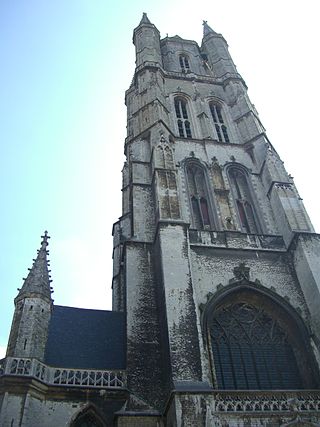
Josquin Lebloitte dit des Prez was a composer of High Renaissance music, who is variously described as French or Franco-Flemish. Considered one of the greatest composers of the Renaissance, he was a central figure of the Franco-Flemish School and had a profound influence on the music of 16th-century Europe. Building on the work of his predecessors Guillaume Du Fay and Johannes Ockeghem, he developed a complex style of expressive—and often imitative—movement between independent voices (polyphony) which informs much of his work. He further emphasized the relationship between text and music, and departed from the early Renaissance tendency towards lengthy melismatic lines on a single syllable, preferring to use shorter, repeated motifs between voices. Josquin was a singer, and his compositions are mainly vocal. They include masses, motets and secular chansons.

Heinrich Isaac was a Netherlandish composer of south Netherlandish origin during the Renaissance era. He wrote masses, motets, songs, and instrumental music. A significant contemporary of Josquin des Prez, Isaac influenced the development of music in Germany. Several variants exist of his name: Ysaac, Ysaak, Henricus, Arrigo d'Ugo, and Arrigo il Tedesco among them.

Orlando di Lasso was a composer of the late Renaissance. The chief representative of the mature polyphonic style in the Franco-Flemish school, Lassus stands with William Byrd, Giovanni Pierluigi da Palestrina, and Tomás Luis de Victoria as one of the leading composers of the later Renaissance. Immensely prolific, his music varies considerably in style and genres, which gave him unprecedented popularity throughout Europe.
Avant-garde music is music that is considered to be at the forefront of innovation in its field, with the term "avant-garde" implying a critique of existing aesthetic conventions, rejection of the status quo in favor of unique or original elements, and the idea of deliberately challenging or alienating audiences. Avant-garde music may be distinguished from experimental music by the way it adopts an extreme position within a certain tradition, whereas experimental music lies outside tradition.
Vicente Lusitano was a Portuguese composer and music theorist of the late Renaissance. Some of his works on musical theory and a small number of compositions survive. Lusitano was for a time a Catholic priest and taught in several Italian cities, but later converted to Protestantism.
Nicolas Gombert was a Franco-Flemish composer of the Renaissance. He was one of the most famous and influential composers between Josquin des Prez and Palestrina, and best represents the fully developed, complex polyphonic style of this period in music history.
Jean Richafort was a Netherlandish composer of the Renaissance, a member of the third generation of the Franco-Flemish School.

Franchinus Gaffurius was an Italian music theorist and composer of the Renaissance.
Lupus Hellinck was a Flemish composer of the Renaissance. He was a prominent composer of masses, as well as German chorales and motets. Although he was a Roman Catholic all of his life, his music shows evidence of sympathy for the Protestant Reformation, and three of his motets—including a famous setting of In te domine speravi—were probably inspired by the prison writings of the martyred reformer Girolamo Savonarola.

The Missa L'homme armé super voces musicales is the first of two settings of the Ordinary of the Mass by Josquin des Prez using the famous L'homme armé tune as his cantus firmus source material. The setting is for four voices. It was the most famous mass Josquin composed, surviving in numerous manuscripts and print editions. The earliest printed collection of music devoted to a single composer, the Misse Josquin published by Ottaviano Petrucci in 1502, begins with this famous work.
The first decade of the 16th century marked the creation of some significant compositions. These were to become some of the most famous compositions of the century.

Jheronimus Vinders was a Franco-Flemish composer of the Renaissance, active at Ghent. He was a minor member of the generation after Josquin des Prez, and he also composed a notable lament on the more famous composer's death.
Gallus Dressler was a German composer and music theorist who served as Kantor in the church school at Magdeburg. Though a few of his works have remained in the choral repertoire, he is best known for his theoretical writings, especially his Praecepta musicae poeticae, which contains some of the earliest detailed description of the compositional process of the Renaissance motet.
Bonnie Jean Blackburn is an American musicologist.
Manfred Cordes is a German conductor of early music, musicologist and teacher. He is professor at the Hochschule für Künste Bremen and was its rector from 2007 to 2012.

Prophetiae Sibyllarum are a series of twelve motets by the Franco-Flemish composer Orlando di Lasso. The works are known for their extremely chromatic idiom.

David Fallows is an English musicologist specializing in music of the late Middle Ages and early Renaissance, as well as the performance practice of music. He is a leader in fifteenth-century music studies, particularly secular song, Guillaume Dufay, and Josquin des Prez, both the subject of landmark biographies Fallows has written.
Ludwig Daser was a German renaissance composer and choirmaster. His career is marked by the Reformation and Counter-Reformation struggles of his time. A noted composer in his day, Daser has been largely overshadowed by Orlande de Lassus, who replaced him in Munich.
Inviolata, integra et casta es Maria is a motet by Josquin des Prez. One of his most famous compositions, it divides the cantus firmus into three sections and is scored for five voices—two carrying the canonical melody and three free.

Albertus Antonius Smijers, was a Dutch musicologist who served as Professor of Musicology at the University of Utrecht. As one of the first Dutch musicologists to receive a doctorate, he chaired several organisations such as the International Musicological Society. Smijers was also a noted authority on Josquin des Pres; he published 44 volumes of Werken van Josquin des Prez from 1941 until his death, while another 11 volumes were published posthumously by his students.









